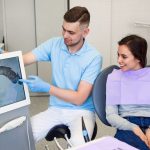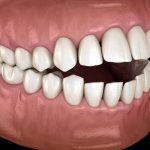Have you noticed that your wisdom teeth have stopped growing but haven’t fully erupted from your gums? Your teeth may be partially impacted.
Find out more about partially impacted teeth in the following article.
How to recognize a partially impacted tooth
A partially impacted tooth is a tooth that has not fully erupted. It’s possible that the tooth is simply in the midst of the process and will emerge fully with time, but it is also possible that the tooth is misaligned in the jaw and is unable to erupt properly.
This is a problem that primarily affects molars and wisdom teeth, which grow later in life.
Oral health problems caused by partially impacted teeth
Partially impacted teeth can lead to various oral health problems.
Firstly, due to their unusual positioning, partially impacted teeth are more difficult to clean, even for those with excellent oral hygiene. They are more likely to accumulate food, plaque and tartar and are more susceptible to cavities and infections.
Partially impacted teeth that continue to grow could affect the positioning of the surrounding teeth, which could cause significant problems and require orthodontic intervention.
Should partially impacted teeth be extracted?
Tooth extraction is not necessarily recommended for partially impacted teeth. If an examination of the anatomy using 3D radiology reveals that the tooth is well-positioned, then it doesn’t need to be extracted.
However, if the tooth is poorly positioned, a maxillofacial surgeon will probably recommend extraction. This will prevent many negative consequences and promote good oral health.
Make an appointment with a maxillofacial surgeon to treat your partially impacted teeth
If you or your dentist notice that you have a partially impacted tooth, it’s important to monitor it closely and act quickly if necessary.
If you end up needing an extraction, don’t hesitate to contact Clinique MFML and make an appointment. You will receive professional, high-quality dental care from our specialists.




